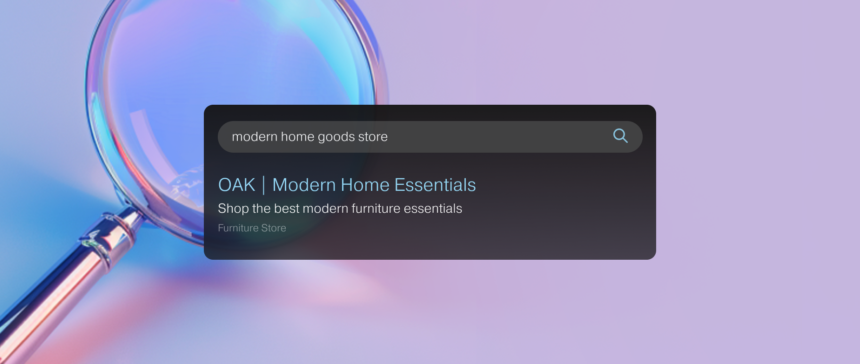Your website title, which appears in a list of search results, acts like a mini billboard with one purpose: to pique your viewers’ interest. A clear and descriptive website title tells users what to expect when they click on a search result.
Learn more about how a well-crafted website title can drive organic traffic to your website and how to write a title that grabs your reader’s attention.
What is the website title?
A website title, or title tag, is the title of a webpage that appears on a website. Search Engine Results Pages (SERPs) It’s there so visitors know what your page is about before they click on it. It’s a concise, informative label of about 60 characters. This label serves two important functions: it provides context to users and helps search engines rank your site.
Why is your website title important?
Website titles are very important Search Engine Optimization (SEO)Search engines like Google use website titles to understand your content and determine how relevant your web pages are to search queries. If your site title accurately reflects what your page is about and incorporates relevant keywords, it’s more likely to rank highly in search results for those keywords. Creating descriptive titles that appeal to both humans and search engines can help attract more organic traffic to your site.
Where to Find Website Titles
The website title can be found in a few places:
Search engine results page
When a user performs a search, the resulting SERP contains a list of website titles, for example, a website title might be “5 Wardrobe Must-Have Items: What Your Closet Needs.”
Web browser tab or window
A website title typically appears at the top of a web browser tab or window, next to the favicon (a picture or logo that represents your website). In the examples below, the website titles are “Our Story” and “Shop Bracelets and Anklets”.


Source code
A more technical approach is to find the website title by viewing the website’s source code. Right-click anywhere on the website and look for the words “Inspect element” or “View page source.” The opening tag
Tips for writing the best website titles
Here are some tips for creating a website title that will help grab the attention of users and search engines.
Convincing
Create title tags that entice users to click. Use strong verbs, action words, or intriguing questions or phrases to pique their interest and encourage them to visit your website instead of a competitor’s. For example, if you want to offer makeup tips, try “5 Makeup Tips Anyone (Yes, You!) Can Do.”
Keep it simple
Keep your title tag under 60 characters. Titles that are too long may be truncated in search results and affect the clarity of the text. If your title was “Backpacking Tents vs Camping Tents: Which Tent is Best for Camping Trips?”, you could shorten it to “Backpacking Tents vs Camping Tents: Which is Right for You?” Shrike Please try to stay within the character limit.
For informational purposes
Keywords are important, but clarity should be a priority. Your title tag should accurately reflect the content of your website and give users a clear understanding of what to expect when they click. If you want to show your readers how to organize their desk, try something like “Desk organization tips to help you tidy up your messy desk quickly.” This way, users can expect quick tips to help them organize their desk quickly.
Stay relevant
Identify keywords and phrases that users are likely to search for when looking for information related to your website content. Incorporate relevant keywords into your title tags and exclude irrelevant keywords as they can hurt your rankings. If your web page describes different candle scents, don’t add keywords that promise to teach readers how to create their own scent if the text doesn’t include that information.
Try something unique
Strive to create unique title tags that stand out from your competitors. Avoid generic titles that blend in with search results. Unique, informative title tags grab users’ attention and encourage them to click.
Put your target keywords forward
To increase your chances of appearing at the top of the SERPs, add your target keyword to the beginning of your title tag. For example, if you’re targeting the keyword “waterproof picnic blankets,” a title like “5 Waterproof Picnic Blankets for Family Outings” will perform better than “5 Waterproof Picnic Blankets to Make Your Summer More Fun.”
10 Website Title Examples
1. Beat the Heat: 5 Must-Have Cooling Products for Your Home
2. Upgrade your kitchen: Essential appliances for every chef
3. Organizational inspiration: studio storage solutions
4. Fitness Trackers vs. Smartwatches: Which is Right for You?
5. How to create a productive and comfortable home office
6. Level up with essential camera accessories
7. Best mattresses for light sleepers
8. 8 Tips to Make Back to School Shopping Easier
9. Travel Hacks for Pet Owners: How to Travel by Plane
10. Top-notch headphones and speakers for every budget
Website Title FAQ
How do I choose a title for my website?
When choosing a website title, you need to strike a balance between something that users will find useful and something that will help your site rank higher in search engines. Use keyword research tools to identify relevant keywords and phrases that your target users are likely to search for when looking for information related to your website content.
How do you find the title of a website?
Your website title appears on search engine results pages and next to your web browser tab or window. Faviconin the page’s source code
What are some common mistakes to avoid when writing website titles?
When writing your website title, avoid keyword stuffing (cramming too many keywords into your title tag) and using terms that are not related to your content, as search engines may penalize you for this. Also, avoid long or vague titles, as they may confuse users.







